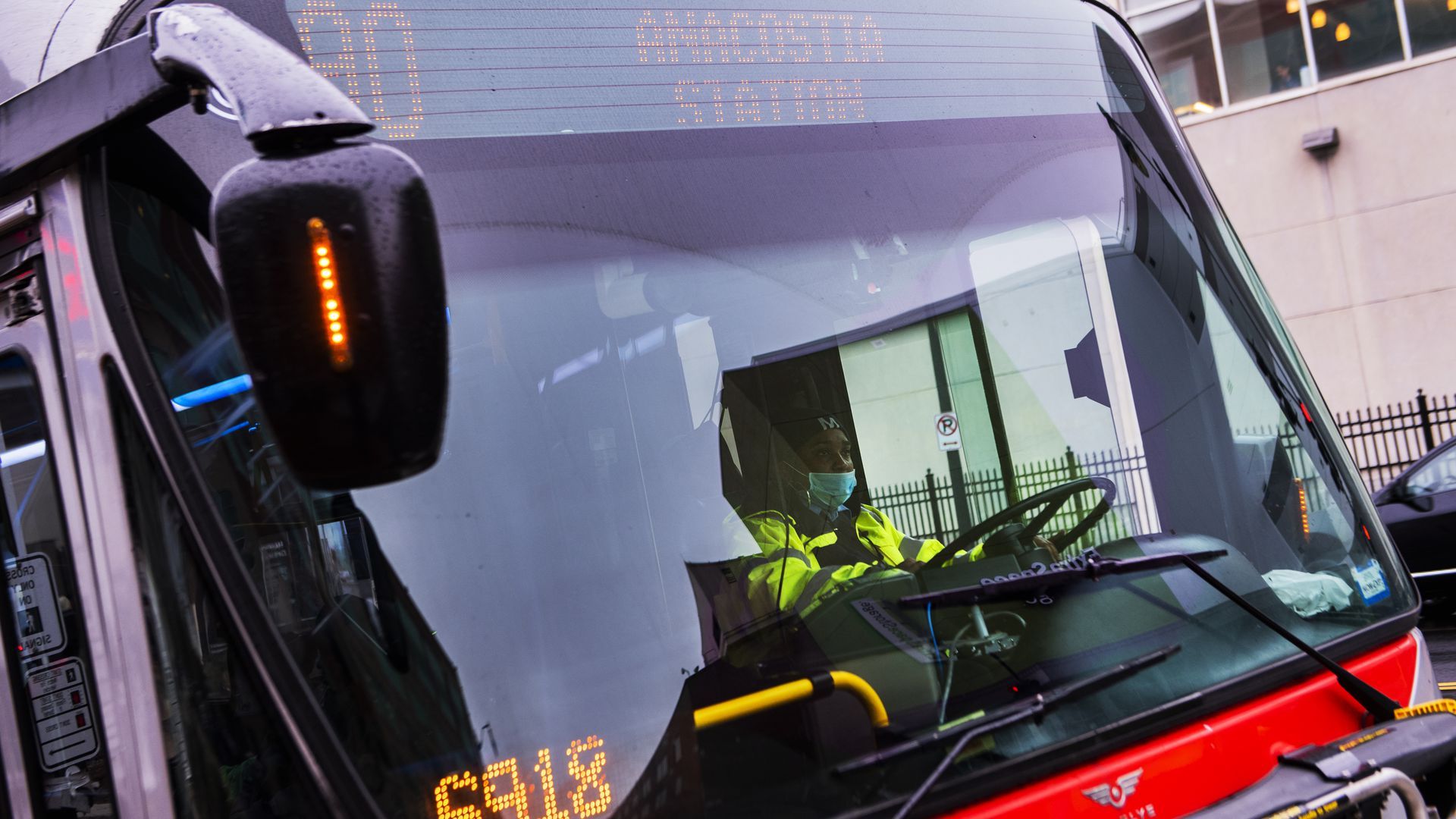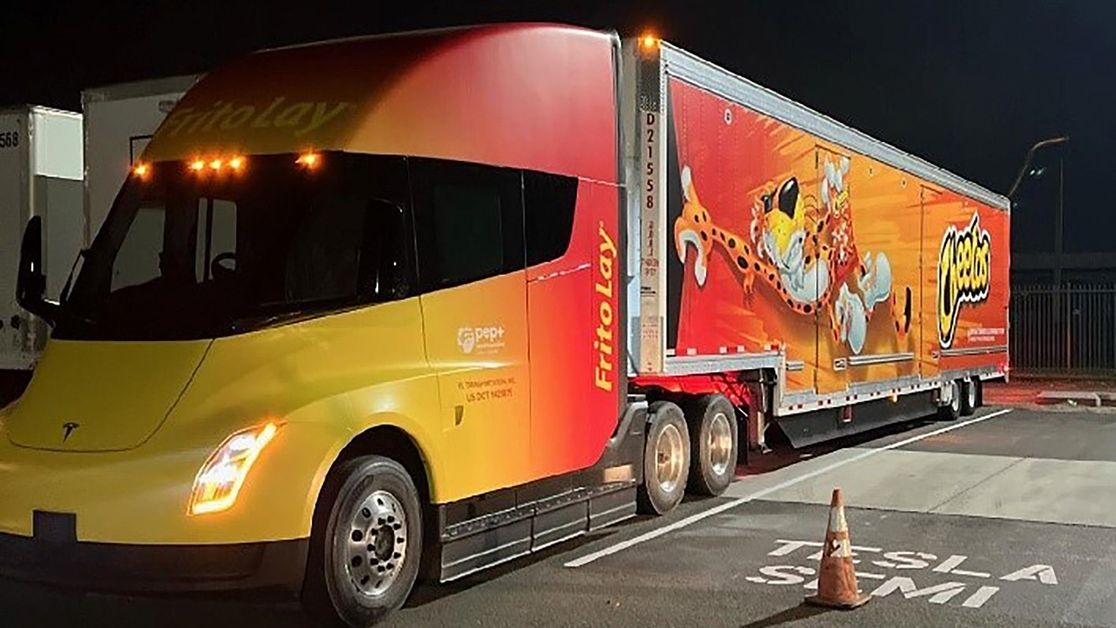| | | | | | | Presented By Capital One | | | | Axios What's Next | | By Joann Muller, Jennifer A. Kingson and Alex Fitzpatrick · Dec 05, 2022 | | There's no denying the flashy looks of Tesla's new electric big rig — but whether it makes commercial sense is another thing entirely, Joann writes today. Today's newsletter is 1,129 words ... 4 minutes. | | | | | | 1 big thing: Tesla's big rig faces uphill climb |  | | | Illustration: Eniola Odetunde/Axios | | | | Tesla's flashy new electric Semi truck isn't very practical for most freight haulers under pressure to reduce their carbon footprint, Joann Muller writes. Why it matters: Driving what CEO Elon Musk calls "the most bad-ass rig on the road" doesn't matter to commercial truck operators, who are worried about hitting tougher emissions targets as well as long-term reliability and total cost of ownership. - Other technologies, including natural gas, hydrogen fuel cells and even a proposal to use cleaner-burning, plant-based fuels in traditional diesel engines could offer better solutions.
Driving the news: Tesla last week delivered the company's first heavy-duty Semi to PepsiCo's Modesto, Calif., factory. - After taking delivery, PepsiCo completed its first cargo run by delivering snacks from its Frito-Lay subsidiary to those attending Tesla's launch event in Nevada.
- Musk said the Semi completed a 500-mile drive on a single charge, with the Semi and cargo weighing in at 81,000 total pounds.
The Tesla Semi with Cheetos branding. Photo courtesy PepsiCo Yes, but: Tesla omitted crucial information, including the truck's empty weight — an important consideration for measuring its efficiency. - A Tesla Semi "fully loaded" with Doritos can go farther than a truck packed with cases of Pepsi.
- "Not very impressive — moving a cargo of chips (average weight per pack 52 grams) cannot in any way be said to be definitive proof of concept," said Oliver Dixon, senior analyst at consultancy Guidehouse, per Reuters.
Be smart: There's a basic physics problem with electric trucks that goes straight to operators' bottom line. - Hauling a fully-loaded 18-wheel tractor down the highway requires a lot of electricity. But batteries are big, heavy and expensive.
- The larger the battery, the less cargo the truck can carry. The heavier the cargo, the shorter the driving range. Less cargo and range usually means less profit.
The alternatives: One Bill Gates-backed startup, ClearFlame, is promoting a simpler way for freight haulers to meet sustainability goals using their existing diesel trucks. - ClearFlame's engine modification technology aims to "take the dirty diesel fuel out of diesel engines" and replace it with cleaner-burning plant-based fuels, like ethanol, methanol or ammonia.
- The system is 30% to 40% less expensive than diesel, electric, natural gas or hydrogen on a total cost of ownership basis, co-founder and CEO BJ Johnson tells Axios.
By the numbers: ClearFlame estimates its system produces 42% lower carbon emissions than diesel, and 22% lower than battery electric vehicles, based on the country's average mix of renewables and fossil fuels. How it works: In a typical diesel engine, diesel fuel is injected into the combustion chamber and ignited by hot compressed air. - Alternative fuels like ethanol and methanol require higher temperatures to burn.
- ClearFlame's solution — with a few minor engine modifications — is to pipe the truck's hot exhaust back into the combustion chamber, a system known as exhaust gas recirculation (EGR).
- The technology is being tested in pilot fleets using ethanol, a widely-available fuel.
The bottom line: It's likely to take a mix of new technologies for truckers to cut emissions and meet sustainability targets. Share this story. |     | | | | | | 2. D.C. eyes free bus rides |  | | | A Washington, D.C.-area metrobus. Photo: Tom Williams/CQ-Roll Call via Getty Images | | | | Washington, D.C.-area bus rides could be free starting next summer, Axios' Chelsea Cirruzzo reports. Why it matters: Local officials say the move would make the transit system more equitable, as well as improve speed and efficiency. - One in three D.C. residents commutes via public transit, per the city's budget director, and 68% of bus riders come from households with incomes under $50,000.
Details: The relevant legislation, recently introduced in the D.C. Council, would make free all rides starting in the District, while adding overnight service to 12 major lines. - WMATA, the local transit authority, also recently launched Metrorail service to Dulles International Airport.
What's next: The bill is considered likely to pass by the end of this month. - If it does, D.C. would join a handful of other cities newly offering free public transit, including Kansas City, Mo., and Alexandria, Va.
Read the rest. |     | | | | | | 3. How the pandemic aged teen brains |  | | | Illustration: Allie Carl/Axios | | | | The stress of living through the COVID-19 pandemic prematurely aged adolescents' brains by at least three or four years, according to a Stanford University study, Axios' Sabrina Moreno reports. Why it matters: While the behavioral effects of the pandemic are well-documented, data on youths' neurological development has been scarce. What they found: In a comparison of 163 teenage MRI scans — half of which were taken before the pandemic and half after — the "after" group displayed accelerated signs of aging commonly seen in children experiencing violence and neglect. - The youths studied were also more likely to report severe anxiety, depression and internalizing mental health problems.
Yes, but: Accelerated aging of the brain is not necessarily a bad thing, said Ian Gotlib, the study's lead author and a Stanford psychology professor. - "These are 16-, 18-year-olds. They're not atrophying in the alarmist sense," Gotlib told Axios.
- "For me, the cause for concern is their higher rates of depression and anxiety and sadness."
What's next: Researchers will follow up with these participants in two years to see if the aging continues accelerating. Read the rest. |     | | | | | | A message from Capital One | | 19 million Americans don't have access to reliable internet | | |  | | | | The unequal access to affordable and reliable internet is creating a digital divide. Why it's important: Access to the internet, hardware and sufficient digital infrastructure serve as the "on ramp" for remote work, education and telehealth. Learn how Capital One is closing this divide. | | | | | | 4. 📉 Savings shortfall |  Data: Bureau of Economic Analysis via FRED; Chart: Axios Visuals Americans are spending most of what they're earning these days, Axios' Emily Peck reports. - The savings rate in October was the lowest since 2005 — and the second-lowest on record, according to new Commerce Department data.
Why it matters: Thanks to higher prices and a return to "normal" life that has folks traveling and going out again, Americans are spending more and saving less. - And for now, many are sitting on a lot of savings — so they don't need to sock as much money away.
Zoom out: A lot of folks built up a big cash cushion over the past couple of years — note the big spike in the chart above — but with inflation trending higher than wage increases, at some point, something's got to give. Share this story. |     | | | | | | 5. Nintendo's mobile woes |  | | | The Nintendo logo on a mobile device. Photo: Budrul Chukrut/SOPA Images/LightRocket via Getty Images | | | | Nintendo has had meager success at best in the mobile world despite its proven game-making expertise, Axios Gaming's Stephen Totilo writes. - Since 2018, Nintendo has shut down as many mobile games as it has launched.
Driving the news: Dragalia Lost, a mobile game co-developed by Nintendo and Cygames, shut down last week. - Nintendo's mobile games revenue has been dropping all year and remains a minuscule part of its business.
- The company has plenty of Switch games on the docket, but it hasn't announced a new mobile game since Pikmin Bloom was unveiled and launched in October 2021.
Yes, but: The Pokémon series, co-owned by Nintendo and managed by The Pokémon Company, has thrived on mobile — primarily via the still-healthy Pokémon Go. What they're saying: "While we feel the importance of generating revenue and profit through our mobile business, our basic strategy with the business is to expand the number of people who have access to Nintendo [intellectual property]," a company rep told Axios. Read the rest. |     | | | | | | A message from Capital One | | "People in our community have lost their jobs" | | |  | | | | Cameron Burton, a director at the Bland County Library in Virginia, says locals have lost their jobs because they don't have internet to work from home. A solution: Capital One, with the American Library Association, supplies hotspots that people can borrow from local libraries. Learn more. | | | | Big thanks to What's Next copy editor Lisa Hornung. Was this email forwarded to you? Get your daily dose of What's Next by signing up here for our free newsletter. |  | | Are you a fan of this email format? Your essential communications — to staff, clients and other stakeholders — can have the same style. Axios HQ, a powerful platform, will help you do it. | | | | | | Axios thanks our partners for supporting our newsletters. If you're interested in advertising, learn more here.
Sponsorship has no influence on editorial content. Axios, 3100 Clarendon Blvd, Arlington VA 22201 | | | You received this email because you signed up for newsletters from Axios.
Change your preferences or unsubscribe here. | | | Was this email forwarded to you?
Sign up now to get Axios in your inbox. | | | | Follow Axios on social media:    | | | | | |











No comments:
Post a Comment